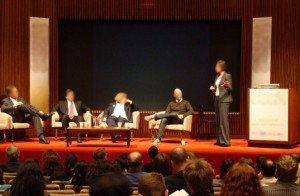DEATH by Panel Discussions
February 25th, 2010 I attended a conference recently that was 50% Panel Discussions vs 50% Presentations. Panel Discussions seem to be part of the “Anti-PowerPoint” trend. I believe the Panel Presentations “trend” is because they are easy to organize, require little planning, ofter exposure to plenty of willing volunteers who claim to be experts in their field, they’re promoted as being more interactive than a “presentation”. And most of all, Panel Discussions at events are a trend, because it’s easier for conference organizers to get people to present on a panel, because they don’t have to fear “Death by PowerPoint”, since most panel discussions I’ve seen lately don’t use PowerPoint slides.
I attended a conference recently that was 50% Panel Discussions vs 50% Presentations. Panel Discussions seem to be part of the “Anti-PowerPoint” trend. I believe the Panel Presentations “trend” is because they are easy to organize, require little planning, ofter exposure to plenty of willing volunteers who claim to be experts in their field, they’re promoted as being more interactive than a “presentation”. And most of all, Panel Discussions at events are a trend, because it’s easier for conference organizers to get people to present on a panel, because they don’t have to fear “Death by PowerPoint”, since most panel discussions I’ve seen lately don’t use PowerPoint slides.
Personally, I often find them boring and a snore fest. How good the panel performs as a group often depends on how skilled the leader is at facilitating a panel discussion. It also does take some speaker skills to be a participant on a successful panel. At this particular event the panel participants seemed to be bored with each other. As one person on the panel talked, the other four people looked bored and uninterested what the others were saying. They just seemed to be waiting for their opportunity to promote themselves as experts and soft sell their businesses.
There was one group that had the good fortune of a terrific facilitator. He asked great questions, kept the conversation going back and forth between all panelists, even asked the audience for some questions to the panel. He listened to answers and played off the particular expertise of each panelist. He seemed like he knew his panelist – maybe did some preparation before the event and researched his panelist or even spoke to them before their time on stage.
What does it take to have a successful Panel Presentation? First be sure the leader of the group has experience facilitating good group discussions. If you are a facilitator of a panel discussion, do the group and audience a big favor, spend some time researching who is on the panel (if you don’t know them already), and have some prepared questions. Your questions don’t have to be used, but good to have if the flow of worthwhile info goes off into a wild tangent or stops.
If you are a participant, you should also research your fellow panelist, and facilitator. It would help if you contact the panel leader to find out what type of questions he/she will be asking. Pay attention when others are speaking, look at them, even if you have to pretend being interested in what they are saying. It appears rude and selfish if you are sharing the stage, but looking as if you are bored to death or checking your text messages on your cell phone. Being on a panel obviously requires less work than having to prepare a speech and slides, but it should include some preparation work if you want to insure that you appear to be the expert you claim to be and contribute successfully to sharing interesting and helpful information to the audience.
The facilitator and panel participants need to remember the purpose is share information with the audience. It’s not just having the audience observe a group discussion.
Personally, I’d rather see six 10 minute presentations, than 60 minutes of sitting in an audience and observing a group discussion. Yes, you can kill a meeting with a BAD PowerPoint slides, but you can just as quickly kill a meeting with a bad panel discussion.

March 20th, 2010 at 3:37 pm
Great post. Your site’s awesome!
April 10th, 2011 at 3:41 pm
6mQvP7 Very true! Makes a change to see someone spell it out like that. 🙂